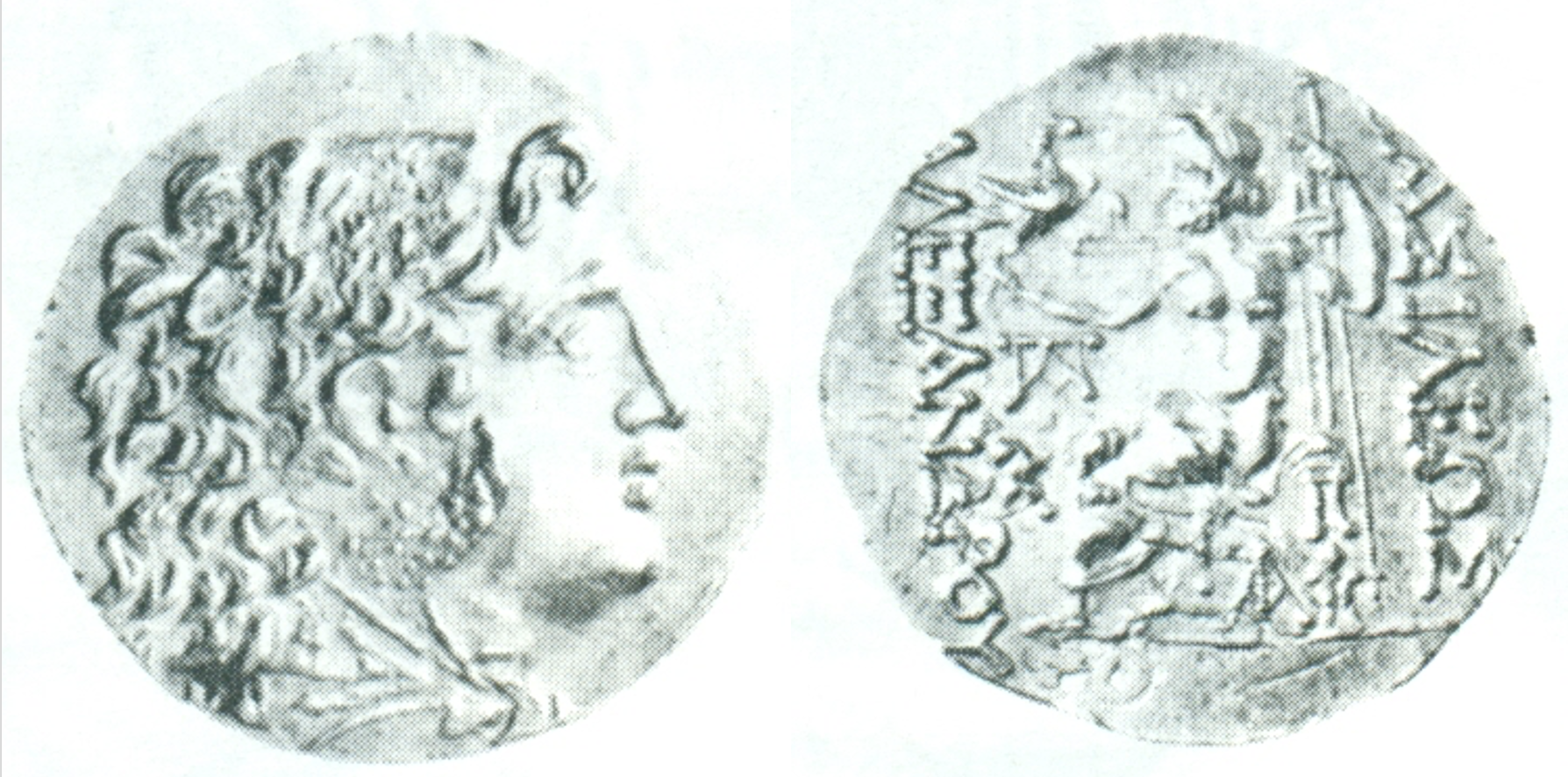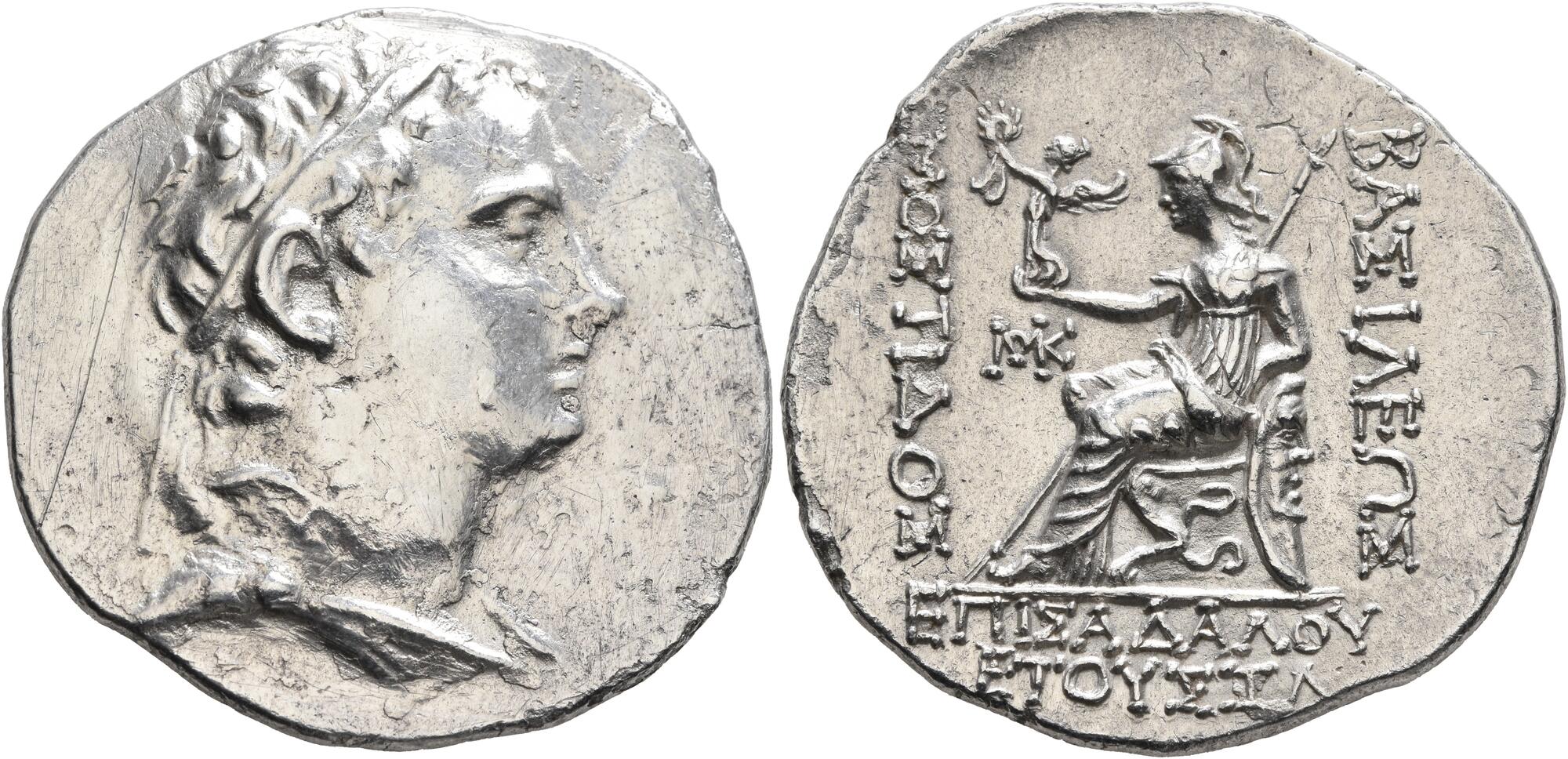85 BCE - 65 BCE | BAΣΙΛΕΩΣ AΛΕΞANΔΡΟΥ
Overstriking coin
SO 850 - Mesembria (Alexander the Great) .png
|
|
Sale(s)Sale(s) ᵖ:
|
Lanz 44, 16 May 1988, lot 109.
|
|
|
|
Description
| ObverseInscription or printing placed on the obverse.:
|
Head of Herakles right, wearing lion skin headdress.
|
ReverseInscription or printing placed on the reverse.:
|
BAΣΙΛΕΩΣ AΛΕΞANΔΡΟΥ (Greek) Zeus enthroned left, holding eagle and scepter. Under the throne, monogram (MYP). In left field, monogram (ΔΑΡ) and Corinthian crested helmet.
|
Mint and issuing power
| MintIdentifies the place of manufacture or issue of a numismatic object.:
|
Mesembria
|
Ancient regionAncient region.
|
Thrace
|
Modern countryModern country: Bulgaria
|
AuthorityIdentifies the issuing power. The authority can be "pretended" when the name or the portrait of X is on the coin but he/she was not the issuing power. It can also be "uncertain" when there is no mention of X on the coin but he/she was the issuing power according to the historical sources:
|
Alexander III the Great (Argead king, 336-323 BC)
|
Chronology
| FromIdentifies the initial date in a range assigned in a numismatic context. 85 BCE toIdentifies the final date in a range assigned in a numismatic context.. 65 BCE
|
hellenistic periodTime period of the numismatic object.
|
Physical description
MetalThe physical material (usually metal) from which an object is made.: Silver 
|
WeightWeight of the numismatic object (in grams). in grams: 16.0716.07 g <br />16,070 mg <br />
|
DenominationTerm indicating the value of a numismatic object. Examples: tetradrachm, chalkous, denarius.: tetradrachm 
|
AxisDescribes the directional relationship between the obverse and reverse of a numismatic object.: 1111 mm <br />1.1 cm <br />
|
|
|
StandardStandard.: Attic
|
References
| Coin referenceReference of the Coin:
|
Callataÿ 1993d, p. 337, D3/R1a
|
Coin series referenceReference to coin series study:
|
Price 19911Price 1991, n° 1109A, Callataÿ 19912Callataÿ 1991, p. 37-45, pl. II., Callataÿ 1993d3Callataÿ 1993d, p. 337, D3/R1a., Karayotov 19944Karayotov 1994, p. 110, n° 764 (O86-R278, monogram 103), Callataÿ 1997a5Callataÿ 1997a, p. 104, D3/R1a, Callataÿ 2021a6Callataÿ 2021a, p. 278, n° 29
|
| Coin series web referenceCoin series web references:
|
|
Description
| ObverseInscription or printing placed on the obverse.:
|
|
ReverseInscription or printing placed on the reverse.:
|
(visible: ΤΟΥΣ on the lower field).
|
Mint and issuing power
Chronology
| FromIdentifies the initial date in a range assigned in a numismatic context. toIdentifies the final date in a range assigned in a numismatic context..
|
periodTime period of the numismatic object.
|
Physical description
| DenominationTerm indicating the value of a numismatic object. Examples: tetradrachm, chalkous, denarius. ᵖ:
|
tetradrachm 
|
|
|
References
References
- ^ Price, Martin Jessop (1991), The Coinage in the Name of Alexander the Great and Philip Arrhidaeus: a British Museum Catalogue, 2 vol., Zürich-London, 637 p., 637 p., clix pl.
- ^ Callataÿ, François de (1991), “Un tétradrachme de Mithridate surfrappé à Maronée”, Numismatica e Antichità Classiche. Quaderni Ticinesi, 20, p. 213-226.
- ^ Callataÿ, François de (1993), "Les derniers alexandres posthumes frappés à Odessos et Mesembria", Studies on the Settlement Life in Ancient Thrace. Proceedings of the IIIrd International Symposium "Cabyle". 17-23 May 1993, Jambol, Istoricheski muzei.
- ^ Karayotov, Ivan (1994), The coinage of Mesambria. vol. 1: silver and gold coins of Mesambria, Centre of Underwater Archaeology, Sozopol, 134 p. and 44 pl.
- ^ Callataÿ, François de (1997), L'histoire des guerres mithridatiques vue par les monnaies, Numismatica Lovaniensia 18, Louvain-la-Neuve, XIII + 481 p. et 54 pl.
- ^ Callataÿ, François de (2021), “On pattern and purpose of overstrikes of late Hellenistic tetradrachms in Thrace Macedonia”, in Ulrike Peter and Bernhard Weisser (eds.), Thrace. Local coinage and regional identity, Berlin Studies of the Ancient World 77, Berlin, Topoi, p. 263-289.


